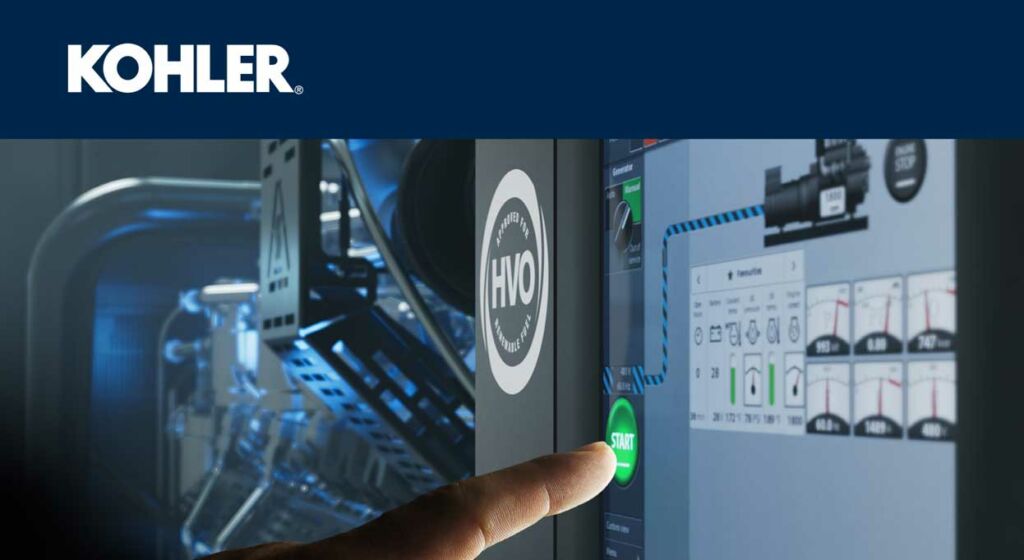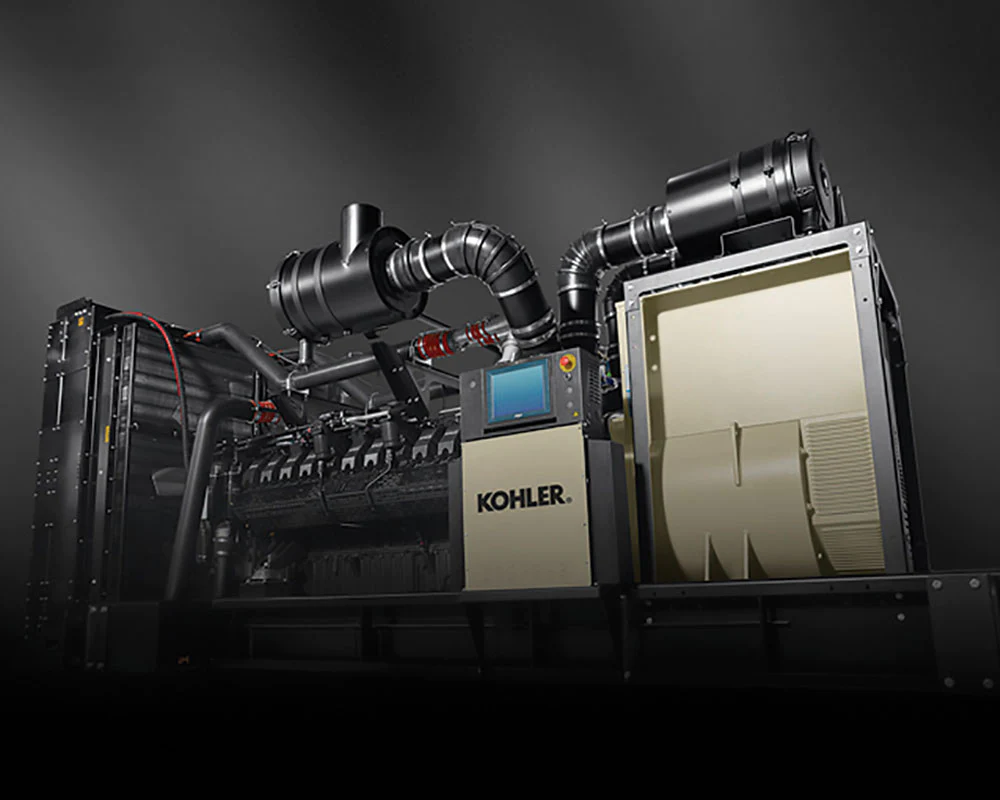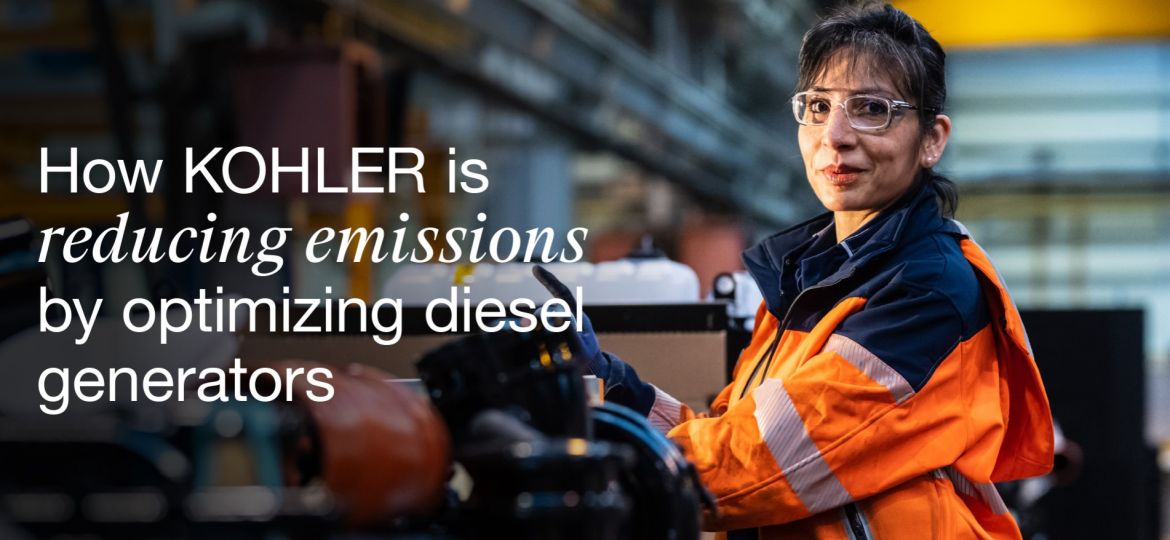Diesel generators serve as the vital foundation for an unwavering energy solution, dedicated to bolstering critical applications. These time-tested marvels exhibit unparalleled performance, guaranteeing a trustworthy reservoir of emergency backup power. With an impressive ability to initiate within a mere 10 seconds, these generators thrive on a robust fuel supply network that has stood the test of time. Nonetheless, the notion of sustainability is seldom associated with these powerhouses. Hence, we must ponder upon the ways to curtail their emissions and minimize their environmental footprint.
In an era characterized by growing environmental concerns and heightened awareness of climate change, businesses worldwide are under increasing pressure to reduce their carbon footprint. Among these businesses, KOHLER, a renowned leader in power generation solutions, stands out for its remarkable efforts to reduce emissions by optimizing diesel generators. This article delves into the intricate mechanisms behind diesel generator emissions and how KOHLER, through cutting-edge technology and unwavering commitment, is spearheading change in the industry.
By employing a comprehensive range of emission reduction technologies and tailoring them to specific requirements, Kohler ensure that Kohler diesel generators meet and surpass stringent emissions standards.
At Kohler understand that each application demands a unique approach to emission optimization, and they are committed to staying at the forefront of technology to deliver the most efficient and environmentally friendly solutions. By continually innovating and exploring new advancements, Kohler strive to provide Brags & Hayes Generators customers with reliable power generation options that not only meet their energy needs but also minimize their environmental impact.
HVO: A RENEWABLE FUEL FOR DIESEL GENERATORS

To mitigate diesel generators emissions, Kohler can seize a significant opportunity by transitioning from diesel to renewable fuel sources. One promising alternative that stands out is hydrotreated vegetable oil (HVO), which offers a compelling solution with its lower greenhouse gas (GHG) emissions profile compared to traditional petroleum-derived diesel.
The production of HVO involves either hydrogenation, which adds hydrogen molecules to vegetable oil, or hydrocracking, which employs hydrogen to break down large molecules into smaller ones. Referred to as green diesel or renewable diesel, utilizing HVO instead of conventional diesel can substantially reduce net CO2 emissions by an impressive 90%.
With the growing interest in sustainable energy solutions, it becomes crucial to explore further advancements in generator emissions reduction. By embracing renewable alternatives like HVO, we not only mitigate the environmental impact but also contribute to an energy landscape characterized by cleaner and more sustainable practices. The transition from diesel to HVO offers a transformative approach, providing a reliable and efficient source of backup power while considerably lessening carbon footprints.
Furthermore, the adoption of HVO in generator systems benefits from an already established and easily adaptable infrastructure. Leveraging the existing fuel supply network for conventional diesel, the integration of HVO into generator operations becomes a seamless transition, offering a well-supported and reliable solution for critical applications. The compatibility of HVO with the current infrastructure eliminates the need for extensive modifications or costly investments, making it an attractive and practical choice for minimizing emissions while ensuring uninterrupted power supply in emergency situations.
HVO’s remarkable similarity in grade and quality to conventional diesel offers immense advantages as it can seamlessly integrate into existing engine and fuel system infrastructures without requiring costly modifications or replacements. KOHLER’s extensive research and proven track record demonstrate that their KD engines function flawlessly with the utilization of HVO.
Not only is HVO compatible with the regular blend of petroleum-derived diesel fuels, but it can also be blended with diesel without any complications. Storing and handling HVO is effortless, and it can maintain its integrity for extended periods without significant degradation. Furthermore, the response time of generators remains commendably quick when powered by HVO, yielding comparable performance to that achieved with traditional diesel, thus ensuring prompt and reliable operation when urgently required.
Let's delve deeper into the exceptional CO2 emission reduction capabilities of HVO.
Consider a typical 1000-kilowatt diesel generators that operates for approximately 100 hours each year on fossil diesel; this translates to an emission footprint equivalent to approximately 16 average cars annually. However, when the same calculation is applied to HVO, the outcome reveals a remarkably reduced carbon impact of less than two cars per year. Such impressive figures underscore the substantial environmental benefits provided by HVO in terms of CO2 emissions reduction. Recognizing the potential of such renewable fuels in creating a more sustainable future, Kohler remains committed to further exploring and developing solutions with other clean fuels.
Beyond its impressive reduction of CO2 emissions, the use of HVO in generators delivers additional environmental advantages. Compared to conventional diesel, HVO combustion produces significantly lower levels of harmful pollutants such as nitrogen oxides (NOx) and particulate matter (PM). This reduction in emissions is not only beneficial for the immediate surroundings but also contributes to overall air quality improvement and public health.
Kohler advanced engine technologies in emissions reduction for diesel generators.

In Kohler continuous pursuit of innovative product development, they remain highly conscious of the trade-offs involved in emission reduction strategies for our gensets. Justin Loritz, Kohler’s Product Manager for large diesel generators in North America, highlighted kohler commitment to optimizing emissions according to specific applications. To achieve this, Kohler prioritize the implementation of in-cylinder technologies such as exhaust gas recirculation (EGR) and combustion optimization. By integrating these engine enhancements, they maximize efficiency and ensure optimal usage of the engine’s capabilities.
With Kohler KD SeriesTM engines, they possess the unique advantage of being able to reduce NOx emissions through precise engine calibrations, eliminating the need for additional aftertreatment technologies. This minimalistic approach not only streamlines operations but also effectively minimizes costs. However, as emission regulations become more stringent, incorporating supplementary equipment becomes necessary.
To address the demands of increasingly strict emission standards, Kohler leverage advanced technologies like Selective Catalytic Reduction (SCR) and Diesel Exhaust Fluid (DEF). These powerful solutions offer the ability to significantly reduce NOx emissions to negligible levels. SCR technology enables the conversion of harmful pollutants into harmless substances through a chemical reaction, while DEF acts as an essential additive that aids in the reduction of emissions.
“In our ongoing efforts to develop cutting-edge genset products, we carefully assess the trade-offs associated with emission reduction and prioritize optimizing emissions for each specific application,” notes Justin Loritz, Product Manager for large diesel generators in North America at Kohler. When it comes to engine enhancements, Kohler begin by focusing on in-cylinder technologies like exhaust gas recirculation (EGR) and combustion optimization to maximize engine efficiency. Notably, Kohler KD SeriesTM engines can reduce NOx emissions through engine calibration alone, without the need for additional after-treatment technologies. This streamlined approach not only minimizes complexity but also avoids additional costs. However, as emission standards become more stringent, additional equipment is required. This is where technologies like Selective Catalytic Reduction (SCR) and Diesel Exhaust Fluid (DEF) come into play, effectively reducing NOx emissions to negligible levels. “These advanced solutions play a crucial role in helping us meet and exceed rigorous emission requirements, ensuring that our generators operate with minimal environmental impact”. At Kohler, we remain dedicated to pushing the boundaries of innovation and adopting the latest emission reduction technologies to provide our customers with efficient and environmentally conscious power solutions.
KOHLER UNCUT Podcast: Talking about Engine Optimization
To expand more on the continuous efforts that Kohler engineers make to optimize the design of their engines, we invite you to listen to the “Engine Optimization” chapter at the following link of the Kohler Podcast “Kohler Uncut”.
Engine Optimization
In this episode we look at engine optimization and what is being done with existing technologies to make them more sustainable while remaining reliable. Is it still possible to innovate and extract value from diesel? Does reducing emissions involve a certain number of compromises? Get the answers from our three Kohler experts, Nicole Dierksheide, Justin Loritz, and Pierre-Adrien Bel.
Optimizing Power diesel generators maintenance schedules
Finding a balance between ensuring generator readiness and minimizing emissions is crucial for optimizing maintenance schedules. Diesel generators designated for emergency standby power typically spend a significant portion of their lives in idleness, waiting for potential outages. However, to maintain peak performance, regular maintenance is essential, which includes periodic running to ensure everything is in proper working order. Traditionally, these maintenance exercises are conducted with a load to mitigate the occurrence of “wet stacking,” a phenomenon where unburned fuel accumulates in the exhaust system, leading to excessive wear and potential damage.
To enhance both the cost-efficiency for customers and our commitment to reducing emissions, Kohler is focused on reducing the frequency and intensity of maintenance runs required each year. By developing innovative approaches, we aim to minimize the necessary hours of operation and decrease the loads required during maintenance exercises.
In line with Kohler sustainability goals, they have introduced Conscious Care™, a sustainable maintenance program available for KD Series generators.
With the KD Series generator, monthly maintenance runs can now be conducted without any load and with extended intervals between exercises, resulting in a significant reduction of up to 69% in annual generator emissions compared to performing maintenance exercises with a 30% load. This reduction is achieved without compromising performance or causing the detrimental effects associated with “Running at a lower load during maintenance exercises is crucial in order to minimize the buildup of unburned fuel in the exhaust system, a phenomenon known as “wet stacking.”
At Kohler, they recognize the importance of balancing generator readiness with environmental concerns, and we are dedicated to optimizing maintenance schedules to achieve both objectives.
KOHLER's exploration of future eco-friendly alternatives.
In addition to HVO, Kohler is actively investigating alternative fuel options that align with their vision of promoting cleaner and greener energy sources. By continuously engaging in research and development, Kohler aims to unlock the potential of these emerging fuels, ensuring a diversified and ever-evolving portfolio of sustainable solutions for critical applications.
The tireless efforts of industry leaders like Kohler, in collaboration with fuel providers, researchers, and policymakers, pave the way for greater advancements in clean fuel technology. By pushing the boundaries of innovation, Kohler can create a future in which generators thrive on renewable energy sources, minimizing their environmental impact while delivering efficient and reliable power when it is most needed.
KOHLER's Commitment to a Greener World
KOHLER’s unwavering commitment to reducing emissions by optimizing diesel generators is a testament to their dedication to creating a greener and more sustainable world. As we navigate the challenges posed by climate change, businesses like KOHLER provide a beacon of hope through their innovative technologies, rigorous compliance, and collaborative efforts.
By understanding the intricacies of diesel generator emissions, embracing advanced engine technologies, and prioritizing fuel efficiency, KOHLER has positioned itself as a pioneer in emissions reduction. Their digital monitoring and control systems not only enhance performance but also contribute significantly to environmental protection.
Furthermore, KOHLER’s exploration of eco-friendly alternatives and their ability to navigate regulatory landscapes with ease demonstrate their commitment to a holistic approach to sustainability. The success stories presented in case studies underscore the practical impact of their initiatives, inspiring others to follow in their footsteps.
While the journey towards emissions reduction is not without challenges, KOHLER’s perseverance serves as a powerful reminder that innovation and dedication can overcome even the most complex environmental issues. As we look to the future, KOHLER’s sustainability goals provide a hopeful vision of a world where emissions are minimized, and environmental preservation is paramount.
Don’t hesitate to reach out for any further information or assistance regarding to KOHLER’s commitment to reducing emissions by optimizing diesel generators. Contact us at the phone number +1.954.657.7777, or write to us at info@bnhgenerators.com, and we will gladly help you.


